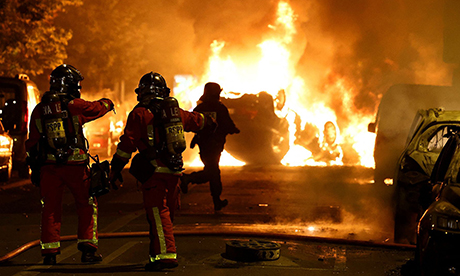The fracture between the French state and youth in impoverished neighbourhoods around the nation’s largest cities has led to widespread violence in recent days.
Religious leaders and institutions are trying to respond after thousands of young people, many the children or grandchildren of North African immigrants who first came to France in large numbers in the 1960s, took to the streets.
They were protesting the killing by police of 17-year-old Nahel Merzouk during a traffic stop on June 27 in Nanterre, a suburb of Paris. Some young people have been involved in robberies, arson and looting as part of the violence.
The fracture between the French state and youth in impoverished neighbourhoods around the nation’s largest cities has led to widespread violence.
Many in France believe Merzouk’s killing blew the lid off years of simmering resentment because of the police treatment of black and Arab youth, the ghettoization of immigrants and their descendants in high-density suburban housing projects around major cities, and the general hopelessness among black and Arab youth who feel like second-class citizens in France.
Images of young people burning public administration buildings and looting schools and shops has been a shock to much of the nation.
One third of those arrested are under 18, and 60 percent have no criminal record.
More than 3,500 have been arrested so far.
One third of those arrested are under 18, and 60 percent have no criminal record, according to the French Minister of Interior.
Only 10 percent of the people arrested were not French-born, but members of the political far right say the rioting demands a more critical look at immigration policy.
The far right’s anti-immigration mantra is seeping through a once ironclad political divide between it and mainstream politics.
“We know the causes” of France’s unrest, Bruno Retailleau, head of the conservative group that dominates the French Senate, said last week on broadcaster France-Info.
“Unfortunately for the second, the third generation, there is a sort of regression toward their origins, their ethnic origins.”
This tragedy is the latest in a series of terrible episodes that reflect a muted tension that has been building for years at all levels of society.
Mr Retailleau’s remarks, which drew accusations of racism, reflect the current line of his mainstream party, The Republicans, whose priorities to keep France “from sinking durably into chaos” include “stopping mass immigration.”
“This tragedy is the latest in a series of terrible episodes that reflect a muted tension that has been building for years at all levels of society,” said Marin Izoard, the head of communication for Le Rocher Oasis des Cités, a Catholic organization that works with disaffected youths in the notorious high-density “banlieues,” or housing projects that are located around French cities.
“This divide—named as such nearly 30 years ago—runs deep.”
Le Rocher is active in Paris, Lyon, Toulon and Marseille.
“We are doing a very important job in these neighbourhoods, tackling the issue of social fracture from its roots,” Mr Izoard said.
He describes Le Rocher as “an oasis of living together in tough neighbourhoods.”
“We build trust with the residents of these neighborhoods to offer a wide range of activities, workshops and help, for example with administrative [affairs],” assisting housing project residents with paying taxes or in applying for social benefits, he said.
Mr Izoard declined to comment on the riots directly, explaining Le Rocher did not wish to contribute to a prejudiced and clichéd discourse on the young people who have been clashing with police. He did distribute a newsletter describing Le Rocher’s outreach efforts and their importance to communal harmony in France.
Organizations like Le Rocher hope to connect discouraged youth from the banlieues with broader French society, links that the bishop of Nanterre hopes to nurture.
The Most Rev. Matthieu Rougé has pastoral responsibility for around 50 parishes in the Parisian suburbs with one of the most densely populated areas—over 1.5 million residents—in the department of Hauts-de-Seine.
Bishop Rougé has been extremely active among the different racial and religious communities within his diocese during the rioting.
Responding to the disorder in the streets, “my mission was threefold,” he said. “Firstly, to pray, and get people to pray, for peace; secondly, to be present not only to people who were worried [about the violence] or even terrorized, but also to local elected representatives and government officials; thirdly, to call for dialogue and peace, in particular with other religious leaders in Nanterre and the department.
“French secularism is sometimes too rigid,” Bishop Rougé said, “but, paradoxically, it does not exclude good dialogue on the ground between religious leaders and public authorities, which was truly the case during last week’s unrest.”
While many of the youth in the streets have come from the Islamic community, Bishop Rougé does not see religion as a dominant force in the disorder.
Instead, he noted an “educational deficit, social suffering and an identity crisis that we need to work on intensively.”
Discrimination is still widespread in France, with 54 percent of youth saying they have been the victim of derogatory remarks during job interviews, and 41 percent of the French workforce report being victimized by discrimination at some point during their career.
The Covid-19 pandemic struck the banlieues very hard, with many families falling into poverty. Continue reading
